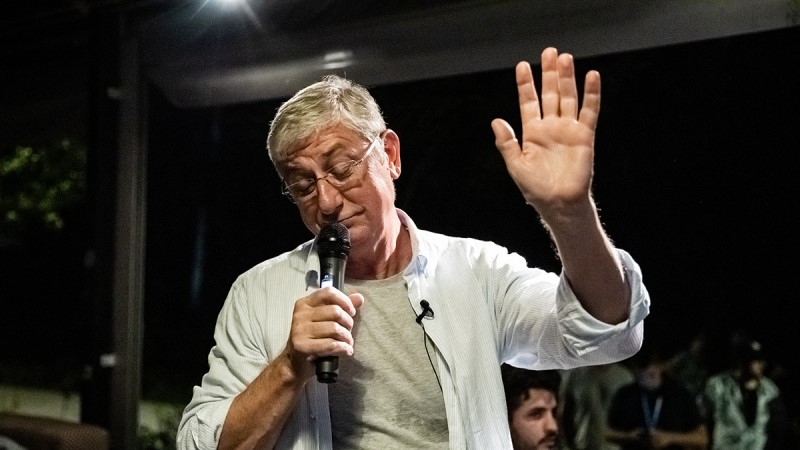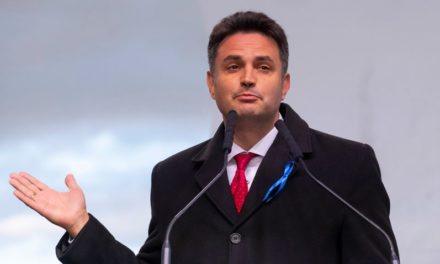All decent atheists in Hungary believe that they know that stinking government propaganda is pouring out of the pulpits.
The good thing about atheists is that the more decisively they try to prove that Hungary is no longer a Christian country, the more flamboyantly they exemplify the opposite of this. Because the non-Buddhist Hungarian citizen who could confidently post a 10-14 paragraph rambling about bodhisattvas, Vajrayana or even just the morals of Zen masters should raise his hand. It wouldn't work like that, would it?
On the other hand, here we have the declared "non-believer" Ferenc Sokszórbérmálkozó, and nothing else: he surprises us with a spontaneous treatise on Augustine of Hippo, revelation and the community of saints. While the atheist journalist of the HVG adjusts us with similar ease in the area of recent church history, the priesthood, and the Eucharist, closing his thoughts with a relaxed "Ite missa est", obviously assuming that his readers will understand: this is a kind of humorous guest text. to be from the Catholic Missal.
If this is a far from Christian country,
then how is it possible that the phrase "Go in peace" can still be considered part of basic education?
That even Árpád W. Tóta is fully aware of Christ's teaching and can intuitively determine that those who believe in it "act in the same way as anyone else"? It is as if some kind of common knowledge is emerging here, rather a culture, in which the atheist - at least for the superficial fan - is just as at home as the Capuchin monk. And for some reason this is not Buddhism.
Nevertheless, as an alumnus of a church school, as a devout Catholic, let me make a few small observations, if only I can chime in with the wisdom of the greats.
With brother Ferenc, we can read the following:
"Can it be disputed that, in the eyes of many, the largest Christian churches seem to be institutions of state power, the ideological resources of this worldly power, rather than merciful guardians of man created by God?"
We can open a debate about this from my side, but it would be unnecessary, because this is already a concrete fact in many places further west of us. For example, at the Synod of the German Evangelical Church the other day, a member of the "Utolsó Generáció" (Utolsó Generáció) spoke, and was given a standing ovation by a significant part of the clergy. The president of the synod also pointed out in front of journalists: in the case of the movement, there is no reason to claim criminal responsibility, they are only "non-violent civil resistance". All this coincides completely with the statements of the president of the Greens, while there is no sign that the church refers to Jesus' admonition "you know neither the day nor the hour" and to a more holistic approach to the protection of creation and at the same time a more stubborn way.
Similarly, it would be difficult not to notice that the synod of German Catholics is urging the "problem-free" change of the gender of transgender people in baptismal registers (with a 94.5 percent majority, God protect the holy remnant) at the very moment when the German law on free gender reassignment is being prepared. So where are the "merciful guardians of man created by God" who would point out that happiness is not brought by self-mutilation or self-deception?
Of course, I understand that the president of the DK considers the Hungarian churches to be the institutions of the state power, he believes
every decent atheist knows that stinking government propaganda is pouring out of the pulpits
- except that last Sunday we also talked about humility and the importance of charity, and instead of filling out the national consultation, the parish priest only drew our attention to the Advent fund-raising and sacramental adoration opportunities.
To be on the safe side, I checked on the Internet what was said in the parish church closest to Szemlőhegy Street, to see if the NER was really raging there - we also hear there that true greatness is shown when someone humbly serves with their power. But I won't spoil any more: every citizen who likes to inform can watch the mass broadcasts at home, and can freely indicate where any kind of secular expertise can be discovered.
, let's also briefly remember the writing of – so the person who is otherwise a flat-out atheist is forced to go there and play the clown. (…) Because there is no other high-quality school nearby; nor is it because the church operates it. These children and parents were forced to have anything to do with the church. (…) It was a stupid plan. No one loves priests and their imaginary friends because they force them to attend mass and sacrifice."
Married. In the year of the Lord 1948 (after a propaganda campaign aimed at some anti-church outbursts by today's leftists), more than three thousand Catholic and more than a thousand Reformed schools were nationalized in Hungary, locking their buildings and equipment with a single stroke of a pen. Today there are a total of 1,573 church public education institutions. It could be doubted whether all of these are really religious, that is, in everyday life; however, to rant about "the decline of schools" is somewhat strong. Would the farmers who got land with the compensation ticket, and thus produce valuable food with the help of area-based subsidies, also be land grabbers?
As for the quality of the schools, the facts show that two Pécs high schools made it into the top 100 in this year's high school ranking of the HVG, but unfortunately neither of them was from Cistercian. So in this case
referring to the church school as the only alternative is a lame argument.
And it would be quite an elitist-pro-segregationist attitude that, being an atheist Libsi, I would rather send my child to a school with a closed nose than to send him to a gymnasium with a lower rating for the moment. If everyone does this, who will set up the "worldview neutral" institutions? If only because our class at the time enrolled in a church high school that had just been reclaimed, was struggling with initial difficulties, and had a shortage of teachers here and there, but by the time we graduated, the institution had gradually become an elite school. You could say we have ennobled it, if I may be so modest. (See, that's why it's lucky if teachers, students and parents pull together.)
And let's not blame the atheist, who supposedly relies strictly on tangible facts instead of beliefs, for envisioning mandatory Holy Communion in church schools (besides, as an open liberal, he rules out that someone can even openly participate in the ceremonies of the community he has joined). Everyone can have their darkest moments. Rather, let us kindly acknowledge that this is a Christian country where even a DK leader and an atheist publicist feel it is their mission to preach the gospel - whether suitable or not.
Featured image: Dávid Mátrai












